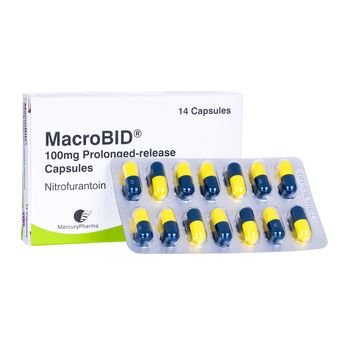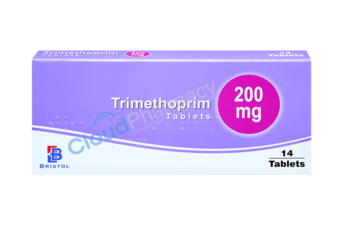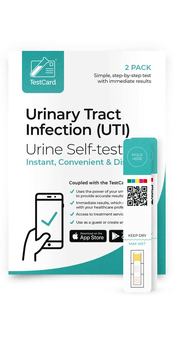Medication features
UTIs are painful and uncomfortable, and if you are suffering from one, it’s understandable that you’ll want to seek treatment. Macrobid 100mg tablets can help you.
- 3-Day Antibiotic Course
- Antibiotic To Treat Urinary Tract, Kidney And Bladder Infections
- Active ingredient: Nitrofurantoin
- Next-day delivery
Overview
What Is Nitrofurantoin?
Nitrofurantoin is an antibiotic that is used to treat and prevent urinary tract infections (UTIs), including cystitis.
Most adults and children can take nitrofurantoin. The medicine comes in strengths of 50mg and 100mg.
Nitrofurantoin was formerly sold under the name Macrobid, but this brand has been discontinued.
What Is Nitrofurantoin Used For?
Nitrofurantoin is used to treat and prevent lower UTIs such as cystitis, prostatitis, urethritis and epididymitis.
A UTI is a common type of infection caused by bacteria — often from the rectum or skin — entering the urethra (the tube through which urine leaves the body) and infecting the lower urinary tract (the bladder and urethra).
How Does Nitrofurantoin Work?
Nitrofurantoin is an antibiotic which kills the bacteria that cause lower urinary tract infections. It belongs to the nitrofuran antibacterial class of medications.
When taken as a tablet, the majority of the nitrofurantoin is filtered from your blood into your urine. The large crystal structure of nitrofurantoin — known as microcrystal — restricts absorption through the gastrointestinal tract. This process concentrates the nitrofurantoin in the location of the bacteria that are causing the UTI.
After the nitrofurantoin makes contact with the bacteria, it breaks down into the active components that inhibit bacterial biochemical processes including cell wall and protein synthesis. Nitrofurantoin can kill bacteria by entering their cells and destroying genetic material.
Nitrofurantoin And Alcohol
You can drink alcohol while you are taking nitrofurantoin. Drinking alcohol in modest amounts won’t usually reduce the effectiveness of antibiotics. However, drinking a lot of alcohol may affect your energy levels and delay your recovery from illness. For this reason, you may want to lower your alcohol intake until you’ve finished your course of nitrofurantoin.
Nitrofurantoin In Pregnancy
If you are pregnant, you can take nitrofurantoin, but you should avoid taking the medicine in the third trimester. This is because there is a small chance that taking nitrofurantoin could lower your baby’s red blood cell count. If you are in your third trimester, your doctor may prescribe another antibiotic.
There is no evidence that nitrofurantoin can cause infertility in men or women.
If your baby is healthy, you can take nitrofurantoin while you are breastfeeding. As nitrofurantoin passes into breast milk in tiny amounts, it is unlikely to trigger side effects in your baby.
Nitrofurantoin courses to treat UTIs are usually short, so you shouldn’t need to take the medicine for any longer than a few weeks. If you do need to take it for longer, ask your doctor about breastfeeding while taking nitrofurantoin.
You shouldn’t take nitrofurantoin while you are breastfeeding if your baby has jaundice or glucose-6-phosphate dehydrogenase (G6PD) deficiency, a rare genetic disorder affecting red blood cells.
Nitrofurantoin Vs Trimethoprim
Nitrofurantoin and trimethoprim are both antibiotics that are used to treat UTIs such as cystitis. They are antibacterial agents that work by preventing bacteria from growing and eliminating them.
Like nitrofurantoin, trimethoprim comes in tablet form. It is available in different strengths to nitrofurantoin — while nitrofurantoin is prescribed as 50mg and 100mg tablets, trimethoprim is prescribed as 100mg or 200mg tablets.
The main difference between these two medicines lies in their usage. Nitrofurantoin is used to treat UTIs that are caused by susceptible bacteria (any bacteria that is unable to grow in the presence of one or more antibiotics), whereas trimethoprim is used to treat UTIs (as well as ear infections and kidney infections) that are caused by specific bacteria.
A clinical trial which compared nitrofurantoin to trimethoprim in the treatment of young women with acute UTIs found that ‘TMP (trimethoprim) and nitrofurantoin were tolerated well and were effective for the treatment of acute urinary tract infections in women’.
Cephalexin Vs Nitrofurantoin
Cephalexin and nitrofurantoin are both antibiotics that are used to treat UTIs. Their main difference is that while nitrofurantoin is used to treat and prevent the return of UTIs and bladder infections, cephalexin is used to treat UTIs but not usually to prevent them from returning.
Cephalexin is also used to treat a wider range of infections than nitrofurantoin, including bone infections, skin infections, ear infections and upper respiratory tract infections.
While cephalexin and nitrofurantoin do share numerous side effects, there are some side effects which are more common with cephalexin, including fever and vaginitis.
Nitrofurantoin Reviews
Users have commented that nitrofurantoin was effective in relieving uncomfortable symptoms of their UTI, such as burning or pain when urinating and pressure in the groin. Some reviewers have said that nitrofurantoin was able to alleviate their symptoms after just one dose. Nitrofurantoin cleared some users’ UTIs within just a few days, as confirmed by their receiving their urine and blood test results.
Many reviewers have reported that they tolerated nitrofurantoin well and did not experience side effects. Commonly reported side effects include urine changing colour, diarrhoea and stomach cramps.
Can You Buy Nitrofurantoin Over The Counter?
Nitrofurantoin is an antibiotic that is only available on prescription. You cannot buy nitrofurantoin over the counter in the UK.
Why not purchase nitrofurantoin tablets through Cloud Pharmacy’s online pharmacy? You’ll just need to complete a short consultation, after which one of our online pharmacists will be able to approve your medication. Your nitrofurantoin tablets can then be dispensed and sent to you promptly via next-day delivery.
Directions
How To Take Nitrofurantoin
You should take nitrofurantoin as directed by your doctor and follow the instructions that accompany your tablets.
Your dose of nitrofurantoin will depend on whether it is treating or preventing a UTI, as well as other factors such as the severity of the infection and your age.
The normal adult dose of nitrofurantoin to treat a UTI is either one 50mg standard tablet, four times per day, or one 100mg slow-release tablet, twice per day. The normal adult dose of nitrofurantoin to prevent a UTI from returning is one 50-100mg tablet, once per day.
Doses are typically lower for children, with the correct dose being calculated by a doctor according to the child’s age and weight.
If you are taking nitrofurantoin to treat a UTI, space your doses out evenly — if taking twice per day, you could take a dose with breakfast and a dose with your evening meal; if taking four times per day, aim for a dose with each of your three meals and a dose before bed with a snack. Adults who are taking nitrofurantoin once per day to prevent a UTI from returning should take one tablet at night.
Nitrofurantoin tablets should be swallowed whole with water, with or after a meal or snack.
Never break, chew or crush the tablets.
If you forget to take a dose, take it immediately when you remember, unless it is almost time for your next dose, in which case take the next dose as normal. Do not take a double dose to compensate for the forgotten dose.
How Long Does It Take For Nitrofurantoin To Work?
Nitrofurantoin should begin to work within three to five days of starting your course. It might take longer — up to a week — for symptoms to clear.
You must complete your full course of nitrofurantoin. Even if you feel better, ensure you finish your medication as directed. This will help prevent the infection from coming back.
When taken to prevent UTIs (such as chronic bladder infections) from returning, your course of nitrofurantoin may be several months long, even if you don’t have symptoms.
Side Effects
Nitrofurantoin Side Effects
As with any medicine, nitrofurantoin may cause side effects. Not everyone will experience side effects from nitrofurantoin.
Common potential side effects of nitrofurantoin include:
- Vomiting
- Nausea
- Diarrhoea
- Headaches
- Sleepiness
- Loss of appetite
If these side effects persist or concern you, speak to your doctor.
Serious side effects from nitrofurantoin are rare — occurring in less than one in 1,000 people — and may include:
- Signs of lung problems, such as coughing up mucus, coughing up blood and shortness of breath
- Jaundice – when the whites of your eyes and skin turn yellow, which could be a sign of gallbladder or liver issues
- Unexplained bruising or bleeding
- Severe headaches
- Pins and needles, tingling and numbness (which may be signs of nerve problems)
If you have any of these serious side effects, contact your doctor or call 999.
Info Leaflet
Nitrofurantoin Patient Information Leaflet
For more information on nitrofurantoin, take a look at the patient information leaflet below:
Nitrofurantoin Tablets FAQs
What is Cystitis?
Cystitis is the medical term given to inflammation of the bladder. It is commonly caused by a bacterial infection and known as a Urinary Tract Infection(UTI).
What are the symptoms of Cystitis?
The signs and symptoms of Cystitis include:
- Persistent urge to pass urine
- Burning sensation when urinating
- Discomfort in pelvic area
- Blood in the urine (hematuria)
- Passing of cloudy or strong-smelling urine
Is Cystitis common?
Women get cystitis more often than men because their anus (back passage) is closer to their urethra, and their urethra is much shorter, which means bacteria may be able to get into the bladder more easily.
The urethra is longer in men than women, this makes it harder for bacteria to travel up to the bladder. Men can also get cystitis but this is significantly less common and they must visit their GP to rule out other serious conditions such as urinary obstruction, enlarged prostate or tumours.
How can I prevent Cystitis?
If you suffer from cystitis regularly, there are measures you can apply to stop it reoccurring. These included but are not limited to:
- Stay Hydrated: drink plenty of water
- Urinate Frequently: if you feel the urge, do not delay passing urine.
- Wipe from front to back: this is in reference to wiping after a bowel movement. It prevents the bacteria from faeces spreading to the vaginal area.
- Use Non-Perfumed products: use perfume free or plain feminine products in the genital area.
- Pass Urine as soon as possible after sexual intercourse: drinking lots of water helps flush bacteria
- Gently wash the skin around genital area: do this daily but take care to not use harsh soaps or wash too vigorously in these delicate areas.
Is Cystitis contagious?
Cystitis is a bacterial infection, however it cannot be transmitted like the common cold. Cystitis is not contagious; you do not need to worry about passing it on to others.
What is the treatment for Cystitis?
The treatment for cystitis depends on it's severity.
For mild infections, you can make the urine less acidic by avoiding carbonated drinks and drinking lots of water. There are also simple sachets such as Cystopurin, Canesten Oasis, Potassium Citrate mixtures.
For more troublesome infections, the bacterial infection can be treated using antibiotics such as Trimethoprim or Macrobid (Nitrofurantoin). These are both available through our online pharmacy.
What is the best antibiotic for Cystitis?
For any bacterial infection, the best antibiotic is dependent on what bacteria is causing the infection. The most common type of bacteria for uncomplicated urinary tract infections is E-Coli.
In the UK, NICE determine guidelines for prescribing using an evidence-based approach.
The antibiotics which are given to treat this bacteria are Trimethoprim or Nitrofurantoin. If your symptoms do not improve after completing a course of these antibiotics, it is imperative that you see your GP to have a urine analysis carried out.
Can you buy treatment over the counter for Cystitis?
There are sachets containing Sodium Bicarbonate or Potassium Citrate which are available over the counter. These alleviate the symptoms however they simply reduce the acidity of urine and their effectiveness lacks sufficient evidence.
Related Products
Nitrofurantoin Tablets Reviews
Confirm Nitrofurantoin Tablets treatment selection
| 100mg | 6 | £19.99 |


















